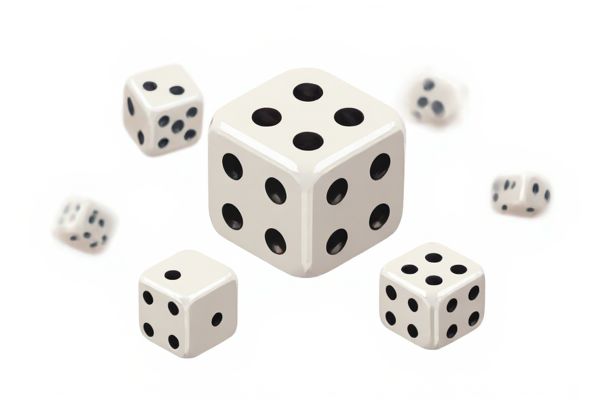
Generate random results effortlessly with this online 1-20 dice roller, designed to provide fair and unpredictable outcomes. Perfect for gaming, decision-making, or simulations, this tool delivers instant, unbiased dice rolls at your fingertips. Experience seamless interaction and reliable randomness to enhance your gameplay or creative projects.
Online tool for random dice generator 1-20
We have prepared several samples for a random dice generator ranging from 1 to 20, ready for you to use and randomize. You can also enter your own custom list to generate random values. With just one click of a button, you will receive a randomized list and a single value to use.Data Source
Single Result
Multiple Results
Introduction to Random Dice Generators
Random dice generators simulate the roll of a 1-20 sided die using algorithms that produce unpredictable results. These tools are essential in tabletop role-playing games and statistical simulations where fair and unbiased outcomes are required. The underlying technology often relies on pseudo-random number generators (PRNGs) to ensure each number from 1 to 20 has an equal probability of appearing.
Importance of Dice Randomization
A random dice generator for numbers 1-20 ensures unbiased outcomes essential for fair gameplay, statistical sampling, and cryptographic applications. Proper dice randomization prevents predictability, enhancing the integrity and trustworthiness of games and simulations. Algorithms employing high-entropy sources and uniform distribution are critical to maintaining true randomness in dice roll results.
Digital vs. Physical Dice Rolls
Digital dice generators use algorithms based on pseudo-random number generation to simulate rolls from 1 to 20, ensuring consistency and reproducibility across devices. Physical dice rolls introduce genuine randomness influenced by factors like surface texture, force, and angle, contributing to unpredictability. While digital dice excel in convenience and speed, physical dice remain favored for tactile feedback and authentic gaming experiences.
Algorithms Behind Dice Randomness
The algorithms behind a random dice generator for numbers 1 to 20 often rely on pseudo-random number generators (PRNGs) such as the Mersenne Twister or Xorshift, which produce sequences of numbers approximating true randomness. These algorithms use mathematical formulas and initial seed values to generate outcomes that simulate the uniform distribution necessary for fair dice rolls. Ensuring algorithmic randomness involves avoiding predictable patterns and biases, making cryptographically secure PRNGs preferable in applications requiring high levels of randomness integrity.
Applications for 1-20 Dice Generators
1-20 dice generators are widely used in tabletop role-playing games (RPGs) like Dungeons & Dragons, where rolls determine character actions, damage, or skill checks. These generators also assist educators in creating interactive math exercises, fostering probability understanding and decision-making skills. Furthermore, software developers integrate 1-20 dice algorithms in game mechanics and simulations to ensure fairness and unpredictability in outcomes.
Ensuring Fairness and Unbiased Results
A random dice generator for values 1-20 utilizes cryptographically secure algorithms to ensure fairness and unbiased outcomes. By leveraging true random number generation methods, it eliminates predictable patterns and manipulations common in pseudo-random systems. Regular auditing and statistical analysis of generated results guarantee consistent uniform distribution across all possible values.
User-Friendly Features for Online Generators
User-friendly online random dice generators for numbers 1-20 often feature intuitive interfaces with large, clickable buttons and clear visual feedback, enhancing ease of use. These generators typically include customizable options such as adjustable dice roll animations and sound effects to enrich the user experience. Responsive design ensures compatibility across devices, allowing seamless gameplay on desktops, tablets, and smartphones.
Security and Integrity in Random Number Generation
A secure 1-20 random dice generator employs cryptographic algorithms to ensure unpredictability and resistance to manipulation, preserving the integrity of each roll. Hardware-based entropy sources or cryptographically secure pseudorandom number generators (CSPRNGs) prevent predictability and replay attacks, crucial for fair gaming or simulations. Regular audits and tamper-evident logging enhance trustworthiness by verifying the randomness quality and detecting anomalies in number generation processes.
Popular Tools and Platforms for Dice Rolling
Random dice generators for numbers 1-20 are widely available on platforms like Roll20, D&D Beyond, and Discord bots such as Avrae, offering seamless integration for tabletop RPG players. These tools utilize secure algorithms to ensure fair and unbiased outcomes, enhancing gameplay experience in Dungeons & Dragons and other role-playing games. Popular mobile apps like Dice by PCalc and Random.org also provide user-friendly interfaces for quick and accurate 20-sided dice rolls.
Future Trends in Virtual Dice Technology
Future trends in virtual dice technology emphasize enhanced realism through advanced physics engines and AI-driven randomness algorithms to simulate authentic 1-20 dice rolls. Integration with augmented reality (AR) and blockchain-based verification systems aims to increase transparency and fairness in digital dice applications. Continued development focuses on multisensory feedback and customizable interfaces to enrich user engagement in tabletop gaming and online gambling platforms.
 azrandom.com
azrandom.com